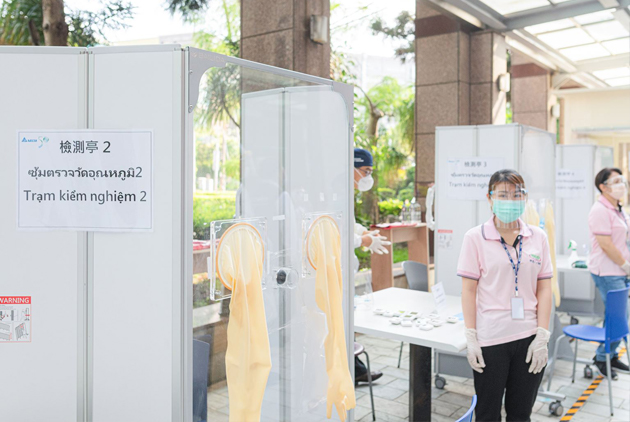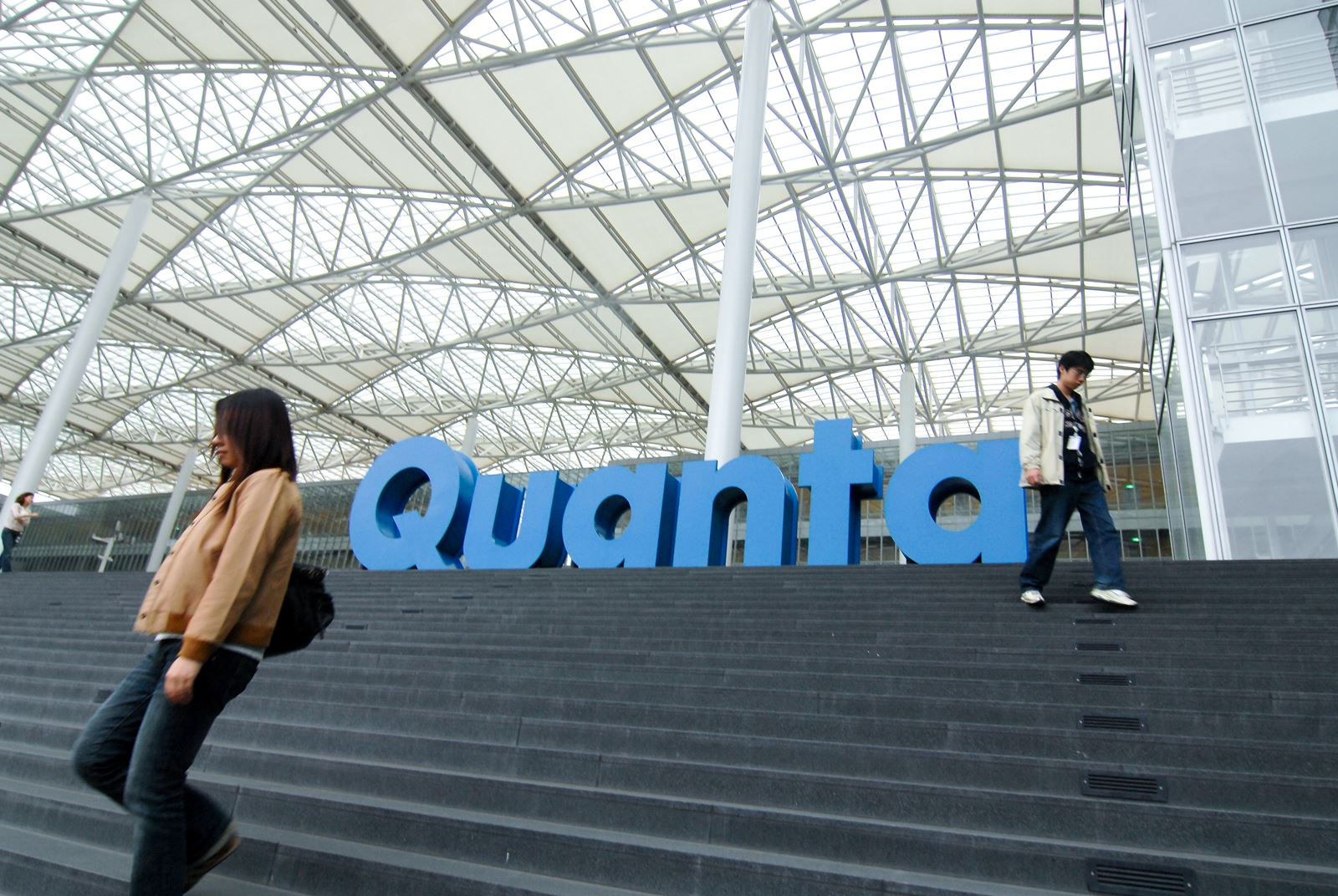How is Taoyuan protecting migrant workers from COVID-19?

Source:Taoyuan City Government
In early June, there was a COVID-19 outbreak among migrant workers in Miaoli’s electronics industry, setting Taiwan’s tech sector on edge. Taoyuan has the largest population of migrant workers in Taiwan with big tech names such as Quanta, Delta, and Foxconn. How has Taoyuan managed to test 20,000 migrant workers to ensure that no one has the virus?
Views
How is Taoyuan protecting migrant workers from COVID-19?
By Elaine Huangweb only
♦ Updated daily |Taiwan’s Covid-19 Outbreak
It is the eve of the Dragon Boat Festival in the Taiwan Free Trade Zone next to Taoyuan International Airport. Ingrasys Technology, the server manufacturing arm of the Foxconn Technology Group, quickly and quietly conducted rapid COVID-19 tests for more than 200 Filipino workers employed at the factory.
Ingrasys is a big name; its servers are used in cloud server rooms operated by Microsoft Azure and Amazon AWS. The global pandemic has made working from home a common practice. In turn, this has increased demand for servers and data centers around the world.
The market research company TrendForce estimates that global server shipments will grow 5.4% year-over-year to reach a record-shattering 13.6 million units in 2021—the highest in three years. Of which, Foxconn Technology Group gets about half of all orders.
That’s why Ingrasys, responsible for developing and manufacturing server solutions for Foxconn, is taking every precaution against the COVID-19 pandemic.
Another Taoyuan-based server manufacturer is Quanta Computer, located in the Hwa Ya Technology Park. A crowd is gathering on the second-floor terrace of Quanta headquarters—migrant workers are getting in line to get their rapid COVID-19 tests.
Quanta has worked closely with the Taoyuan City Government to arrange for medical workers to conduct rapid testing for migrant workers. In case any one tests positive, special taxis are standing by to ferry them to another location to undergo PCR testing. In this way, around 650 workers in the factory were rapidly tested.
Taoyuan is a major center for migrant workers. There are 117,000 migrant workers in Taoyuan, 97,000 of whom work in the industrial sector. That is nine times more than the number of migrant workers in neighboring Hsinchu.
Many of them work in server companies, such as Quanta, Foxconn’s Ingrasys, Compal, Inventec, etc.
Taoyuan Mayor Cheng Wen-tsan has seen how COVID-19 spread among migrant workers in Miaoli’s Zhunan Township. On June 9th, Taoyuan began testing migrant workers by collaborating with enterprises and establishing testing stations in local communities.
Currently, the Taoyuan City Government has eleven rapid testing stations and two PCR testing stations servicing its various industrial zones. These stations work with local hospitals to test around 600 people daily. Any migrant worker who tests positive is relocated to a quarantine hotel to await the result of the PCR test. If the second test is also positive, the patient is moved to a centralized quarantine station or hospital to be quarantined and treated.

On June 9th, when the testing plan was initiated, many systems, packaging and testing, and PCB giants such as Delta, Pegatron, Quanta, Inventec, AUO, ASE Technology, Nan Ya, and Compeq were quick to get in touch with the city government to set up rapid testing procedures for their workers.
By June 17th, Taoyuan had already conducted rapid testing for 18 large companies with over 500 employees each. Overall, 20,000 migrant workers were tested. None tested positive.
The Taoyuan City Government’s goal is to test 50,000 migrant workers in total.
It costs NT$1,000 for medical personnel to conduct rapid testing for each person on-location. This is a price tag that big tech companies are more than happy to pay.
“Enterprises are willing to cover the cost, because they lose more money if plants shut down,” says Chen Chiu-mei (陳秋媚), an official at the Taoyuan Department of Labor.

After a massive outbreak occurred in the dormitories of migrant workers employed by King Yuan Electronics in Zhunan Township, the virus has spread to nearby tech plants. Because Taoyuan has an even higher number of migrant workers, it was a real concern whether the virus would spread from industrial zones to local communities.
“Rapid testing can also allay the fears of local residents, so they can learn not to be scared of migrant workers, who have come to Taiwan to work and are even more afraid of getting infected than we are,” says Chen.
Enterprises inspect dorms and establish safety measures
Taoyuan has conducted rapid testing for 20,000 migrant workers in its industrial zones. Workers in major server manufacturers like Quanta and Ingrasys were tested. The fact that no one has tested positive was a relief to businesses and government officials alike.
The reason may be that these Taiwanese companies have done a great deal of business in China, where the outbreaks first occurred. After over a year of fighting the pandemic and managing migrant workers, these companies have accumulated a lot of know-how.
“The government is telling us not to house migrant workers all in one place—we have already been doing that since last year,” a senior manager at Ingrasys reveals in private.
In China, Ingrasys’s parent company Foxconn hires tens of thousands of workers from different provinces. They are housed in dormitories built by the company or the local governments. Workers need to register to go out. They are separated into different groups when they work, eat, and rest.
In the Ingrasys plant in Taoyuan, managers also uphold rules established by Foxconn. They inspect the workers’ dormitories once every three months. They also ask human resources agencies to ensure that their workers are not housed together with those from other companies.
In order to reduce the risk of infection among migrant workers, Ingrasys also recommended their workers postpone trips back home last year, which they typically do once a year. Ingrasys encouraged migrant workers to refrain from going home, or to postpone their visits, and reimbursed them by paying holiday overtime fees.
This year, as the number of confirmed cases spiked in Taiwan, migrant workers were asked to register when they went out and to where. The company also regularly publishes information about the latest infection hot zones in multiple languages for the migrant workers’ benefit.
A senior manager at Ingrasys says the company cannot restrict the movement of migrant workers, but they can explain the risks and dangers of being infected. They encourage migrant workers to join in the effort to fight the pandemic.
Have you read?
♦ Updated daily |Taiwan’s Covid-19 Outbreak
♦ Hsinchu Science Park’s pandemic response holds Taiwan’s economic lifeline
♦ Taiwan’s COVID-19 legacy depends on working from home and innovative testing
Translated by Jack Chou
Edited by TC Lin
Uploaded by Penny Chiang








